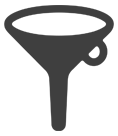2012, action/interaction and installation (printed flour bags, metal shelves, wall text, video), joint project with Vladimir Janchevski, Igor Toshevski, Filip Jovanovski and Gjorgje Jovanovik / Collaborative project by Kooperacija Initiative
Today, art is often seen in the context of the market, where the art work functions mainly as merchandise. But, while mass consumption products are placed on the market, where their commodity and utilitarian values are interdependent, art finds itself often outside of market logics, especially due to its value beyond the material. The type of art that is based on critique of societal reality and thus applies untraditional, innovative methods is often discredited as “elitist” here. Its existence implies the necessity of financial support, regardless of its source. In other words, cultural and economic capital are closely correlated, with the second one being mostly in the hands of ruling elites.
Brecht’s outcry “Food, then morality” leads us to uncover the dominant discourse of power which uses and abuses culture daily, utterly contradicting its basic (social) importance and dimension. Indeed, the dilemma “bread or art” is one of the most debated ones, but this attitude involves some contradiction. Namely, in order to secure their position of economic and political power, the ruling elites, as bearers of the dominant societal discourse, are forced to give up “elitism” in exchange for support of an art that is “closer to the people.” This controversial, populist approach is visible both in the rhetoric of the ruling elites, and their communication strategies and campaigns, especially when it comes to successfully winning over the masses. Promises of a better future are made in the name of the bread and culture, without offering mechanisms to achieve this.
Art certainly cannot meet these promises. On the contrary, it offers lies, but in the name of truth. Hence KAPITAL, as a collaborative project seeks to investigate precisely these connections by shifting aesthetic experience towards a discourse questioning the political-ideological and market parameters, which directly affect the integrity of art and art production.
For KOOPERACIJA, public exhibitions are also platforms for opening of debates on the question of the relationship money/ art, but also on the unavoidable role of those layers of society where financial, and thus political power is concentrated.
Kooperacija
Further reading:
KAPITAL (Kooperacija’s archived website)
Photos / KAPITAL (Kooperacija’s archived website)

